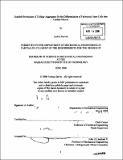Scalable production of cellular aggregates for the differentiation of embryonic stem cells into cardiac muscle
Author(s)
Garvin, Joshua (Joshua J.)
DownloadFull printable version (12.81Mb)
Other Contributors
Massachusetts Institute of Technology. Dept. of Mechanical Engineering.
Advisor
Clark Colton.
Terms of use
Metadata
Show full item recordAbstract
Embryonic stem (ES) cells have the potential to treat many diseases, such as heart disease, diabetes, and Parkinson's disease. However, large numbers of desired differentiated or progenitor cells must be generated from ES cells for many regenerative medicine applications to be successful. Current methods of culture used in the laboratory either cannot be scaled-up to produce sufficiently large numbers of cells or do not consistently produce aggregates of uniform size. In this study, novel methods for aggregating and encapsulating embryonic stem cells were investigated. Latex microspheres and the [beta]TC3 cell line were used in place of ES cells during the development of the methods. Microspheres and cells were encapsulated in an alginate solution coated with poly-L-lysine using an established drip method and a novel fluorinated oil "floating drop" method. Results from these experiments demonstrate that both methods can be used for encapsulating and growing cells. However aggregation, an important aspect for the directed differentiation of ES cells, only occurred using the "floating drop" method, and this method was used to encapsulate a predetermined number of cells in capsules of a specified size. The "floating drop" method has the advantage that culture media can be changed during cell culture to increase the duration of experiments without transferring the aggregates to culture flasks and can potentially be scaled up to produce large numbers of encapsulations.
Description
Thesis (S.B.)--Massachusetts Institute of Technology, Dept. of Mechanical Engineering, 2008. Includes bibliographical references (leaves 36-37).
Date issued
2008Department
Massachusetts Institute of Technology. Department of Mechanical EngineeringPublisher
Massachusetts Institute of Technology
Keywords
Mechanical Engineering.